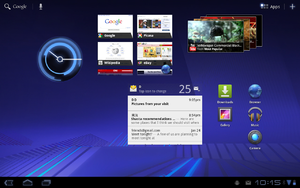Android Honeycomb is the codename for the third major version of Android, designed for devices with larger screen sizes, particularly tablets, however has been unofficially ported to the Nexus One.[2] It is the eighth version of Android and is no longer supported. Honeycomb debuted with the Motorola Xoom in February 2011.[3][4] Besides the addition of new features, Honeycomb introduced a new so-called "holographic" user interface theme and an interaction model that built on the main features of Android, such as multitasking, notifications and widgets.[5][6]
| Version of the Android operating system | |
 | |
 Android 3.0 running on a Motorola Xoom | |
| Developer | |
|---|---|
| Initial release | February 22, 2011 |
| Final release | 3.2.6 / February 15, 2012 |
| Kernel type | Monolithic (Linux) |
| License | Proprietary software[1] |
| Preceded by | Android 2.3.7 "Gingerbread" |
| Succeeded by | Android 4.0 "Ice Cream Sandwich" |
| Official website | developer |
| Support status | |
| Unsupported, Google Play Services support dropped since January 2017 | |
Features
editNew features introduced in Honeycomb include the following:
- The Email and Contacts apps use a two-pane UI.
- The Gallery app now lets users view albums and other collections in full-screen mode, with access to thumbnails for other photos in a collection.
- The Browser app replaces browser windows with tabs, adds an incognito mode for anonymous browsing, and presents bookmarks and history in a unified view, among other features.
- A redesigned keyboard to make entering text easier on large-screen devices such as tablets.
- A Recent Apps view for multitasking.
- Customizable home screens (up to five).
See also
editReferences
edit- ^ Metz, Cade (March 24, 2011). "Steve Jobs vindicated: Google Android is not open". Archived from the original on September 10, 2019. Retrieved June 23, 2018.
- ^ "Android Honeycomb Ported to the Nexus One!". February 21, 2011. Archived from the original on April 15, 2021.
- ^ "What is Android 3.0 Honeycomb? - Definition from WhatIs.com". Archived from the original on April 30, 2020. Retrieved July 29, 2016.
- ^ "Google announces Android 3.1, available on the Verizon Motorola Xoom today". Engadget. Engadget. Archived from the original on June 29, 2019. Retrieved July 29, 2016.
- ^ "The history of Android". Ars Technica. Archived from the original on August 1, 2016. Retrieved September 13, 2015.
- ^ John Brandon. "Android 3.0 (Honeycomb) review". TechRadar. Archived from the original on June 25, 2018. Retrieved September 13, 2015.
External links
edit- Media related to Android Honeycomb at Wikimedia Commons
- Official website